Editor's note: Julie Ruvolo is a freelance writer and editor of RioChromatic.com. You can follow her on Twitter @jruv.
I'm sitting in an office on the 13th floor of Mayor Eduardo Paes's headquarters in Rio de Janeiro. I've come to speak with Pedro Paulo, the Staff Secretary who presided over Rio's first city-sponsored hackathon, an overnight Red Bull and hot-dog infused tech fest that opened up a cache of city data to 75 Rio citizens eager to make their city better with apps.
Pedro Paulo sits across from me at his desk, waxing philosophical about how Mayor Eduardo Paes is eschewing classical, top-down political governance and instituting an era of tech-driven dialog with his municipal subjects.
There's the hackathon, and a new website called Rio+ that lets you suggest and vote up ideas to improve the city. The mayor is Tweetcasting and live streaming, and he hosted his first public Google Hangout last month. Last year he went to Long Beach to give a TED Talk about smart cities, and last week he went to Google Zeitgeist in Arizona to talk about "Polisdigitocracy," which an official press release defines as his "new concept for participatory management, which is specifically relevant to cities and leverages technology in order to generate more transparency, allow for better monitoring and promote better dialogue between government and population." Polisdigitocracy (n): See hackathons.
Pedro Paulo tells me they saw other cities doing them — New York, San Francisco, Chicago — and decided Rio could do one better. He says city officials were so impressed with the quality of ideas that emerged from the hackathon that they plan to develop a full 40 percent of the projects into viable applications – evidence of a veritable dialog-via-apps with the city's citizens.
Solving Problems In Rio
The winning app, called "Open Road" (Rua Aberta), tackles a problem that Rio residents call the city 400 times a day to complain about – illegally parked cars. I'm imagining something like SFPark in San Francisco, which lets you see real-time availability for metered and garage parking spaces, but Pedro Paulo is describing an app that sends you an SMS when you've parked illegally. And asks you to move your car.
Only it's hard to hear him, because there is a crowd of protesters with bullhorns 13 floors below. Hundreds of Rio's public school teachers are demanding an audience with the mayor to discuss their terms to end a month-long strike that has left 30,000 students without teachers. I wonder if there is an app for that.
City-sponsored tech events can seem more like municipal glitz and press release potpourri than opportunities to effect real change. The suspicion would not be unfounded in a city where hundreds of thousands have taken to the streets since June demanding dialog, while the mayor is at Google Zeitgeist talking about Polisdigitocracy.
But what emerged from Rio's first hackathon is a model of what digital citizenship looks like in a city awash in protest culture.
Let's exit the mayor's office and head to Ipanema Beach for coffee with the winning team, and I will make my case for an app that asks you to move your car. But first, a detour to a call center.
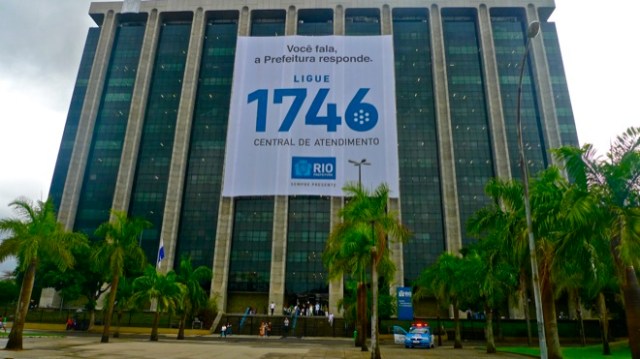
1746 banner over the Mayor's headquarters. Locals call the building "Big Whore" in reference to the red light district that was evicted thirty years ago to make way for it.
In a privately managed call center on the city's periphery, 360 workers – mostly young women – answer more than 200,000 calls a month from concerned residents across Rio de Janeiro.
The city used to have a different phone number for each of its disparate municipal departments until March 2011, when they created one ring to rule them all. Like New Yorkers who dial 311, Rio's residents can now call 1746 to reach 80 different departments, from the trash company to the cemetery.
Trash removal is the most popular service request by a landslide, followed in distant second by irregular parking, public lighting, and rodent removal. Mundane in isolation, the aggregate data – over 7 million calls to date – constructs a pulse of the city's needs and its ability to attend to them.
This is the data goldmine city officials opened up for the Hackathon 1746. They directed participants not to the most popular requests, but to the requests the city has the hardest time addressing.
"They gave us four challenges," Leonardo Eloi, the project manager from the winning team, explains over coffee in Ipanema Beach. "One challenge was tree pruning – they have a backlog of two-and-a-half years wait list. Another problem was public lighting. Another was problems with potholes on the street, and the last one was irregular parking."
The team showed up at the Hackathon with plans to build a crowdsourced map of where the potholes are and help the city prioritize road repairs, but as they learned in Pedro Paulo's opening remarks at the Hackathon, there's already an app for that.
"So we were like, our pothole idea – forget it. Let's start to interview the government people that are at the hackathon," Leonardo says. "We talked to the director of 1746, the Municipal Guard, the guy from the urban cleaning department – because what's the point in offering a solution to a problem that doesn't exist? We wanted to solve something that wasn't just a problem for Rio residents, but something that's simultaneously a problem for residents, for the government, and for 1746."
Leonardo and colleagues are what you could call subject matter experts at solving problems in Rio. Three members of the team – Leonardo Eloi, Nicolas Iensen and Igor Campos – work together at Meu Rio, a privately financed social mobilization platform that has become an extremely useful organizing tool since the city erupted into mass protests this June.

Mayor Eduardo Paes meets the Open Road team.
More than 100,000 Rio residents have used Meu Rio to organize around more than 200 issues. Unlike stateside platforms like Change.org, Meu Rio balks at the idea that signing a petition or liking something on Facebook qualifies as meaningful participation.
Instead, they've rolled out tools that let campaign organizers access contact information – including Facebook pages – for city officials in departments relevant to the issue at hand. They've leveraged their connections to organize face-to-face meetings between campaigners and the city. And they've started launching standalone projects like De Guarda ("On Guard"), a neighborhood watch platform in the historic Santa Teresa district that lets concerned residents keep an eye on a warehouse that stores a dwindling supply of historic artifacts. A thousand locals signed up to monitor the webcam feed in the first 24 hours after the De Guarda site launched.
The Meu Rio guys invited two more people to fill out their hackathon dream team – Ygor Barboza, an Android programmer with an office job downtown – on the street where the first protests took place – and Paulo Fernando de Lacerda, a data systems analyst who works for the government: "Seeing as how we were working with an immense data table from 1746."
"The funny thing is that we didn't tell anyone we were from Meu Rio," Leonardo says. "Our perception is that the government thinks we're annoying. We were afraid they'd say, "Hey, let's ignore the Meu Rio guys."
"We wanted to be judged for ourselves and our work," says Igor, an interface designer for Meu Rio. "But maybe it was good for them to see that we're not just here to confront them, but to collaborate."
"Some people in government don't get it," Leonardo says. "They think we're the opposition. It's not opposition. It's dialog."

Team Open Road sees a sign on the way to the hackathon.
On their way into the hackathon, Team Open Road saw a sign. "I saw a truck parked in a handicapped spot," Leonardo tells me, "and the guy didn't have a parking sticker or anything. So I took a photo on my iPhone and sent my complaint to 1746. This was at 7:46am. It took until 9:20am for 1746 to field his complaint and direct it to the appropriate department. So what was the point?"
They struck up a conversation with a Municipal Guard at the hackathon and asked him what happens when he writes someone a parking ticket. He said, "There's usually two excuses. Either, 'I didn't know I couldn't stop here,' or 'It'll just be a minute.'"
The first excuse is a legitimate one in Rio. "Nobody remembers the specifics of what constitutes a legal parking space on the books," Leonardo explains. "It's really complex. Can you park on the left or the right side of the street? What hours of the day can you park there? Do you have to park parallel, or at 45 or 90 degrees? And sometimes there's no sign to tell you."
Not to mention that about a third of Rio's residents – 2 million people – live in favelas, where paved roads and parking spots are often in excruciatingly limited supply. In Rio's largest favela, the German Complex, a third of residents don't have street access to their homes, much less room for a parking spot.
So Rio has an excessive number of irregularly parked cars," Leonardo says. "Downtown, in Copacabana, here in Ipanema Beach, you always see cars parked on the sidewalk, cars parked next to each other the wrong way, cars boxed in, a bunch of problems."
Leonardo says the data cache confirms his personal observation: 1746 receives the most parking complaints downtown, followed by Copacabana Beach, then a neighborhood called Tijuca, sandwiched between the famous Maracana soccer stadium and a dense urban forest.
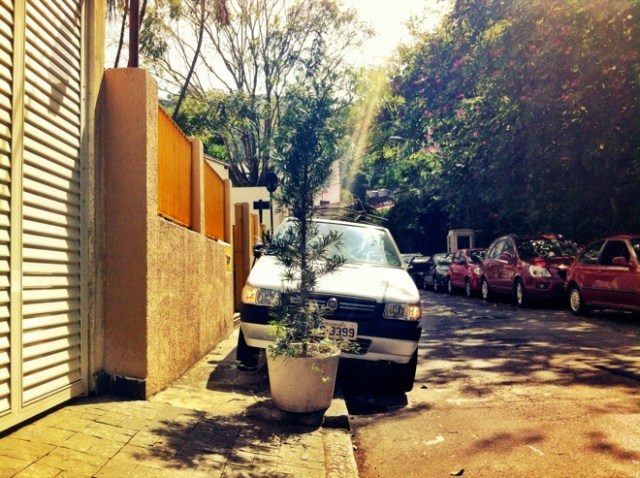
Sidewalk parking: not atypical in Rio.
It's a big headache from Rio's Municipal Guard, which purportedly has more important things to worry about than writing parking tickets. "And when the Municipal Guard has to talk to a driver who's like, 'I didn't know, I'm sorry,' that generates a social cost," Leonardo explains. "The discussion gets heated, you get a headache, you're annoyed."
The problem for 1746 is more of an operational headache. When someone sends a parking complaint to 1746, a call center rep manually copies the information, including license plate number, and routes it to the Municipal Guard, who routes it to a regional department, who sends it to the guard on duty who is physically closest to the illegally parked car. It's a massive game of telephone they play 400 times per day.
If the offending car hasn't already vacated its illegal spot by the time the complaint makes its way through the system, the guard on duty will write a ticket, or call a tow truck if it's blocking a driveway, for example, or in a handicapped spot. If the offending car is still there by the time the tow truck arrives, there's no saying the tow truck can even reach it.
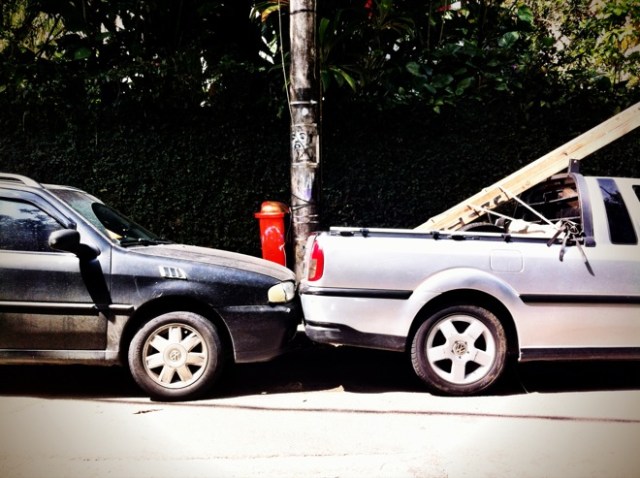
No room for a tow truck.
"Then we discovered that the cost to tow the car and bring it to the tow lot is much more expensive than the amount you pay to take your car back out," Leonardo explains. "You have to spend a lot of money renting the spaces for the tow lot, and it's really far away. Then you've got to pay for a driver, the truck, the gas, the environmental impact. So it's not worth the cost."
"We learned it's even worse when they tow an old car that has a lot of unpaid tickets. Because every year in Rio you have to pay an annual registration fee for your car. And sometimes people don't pay it and get their car towed. And to take your car out of the tow lot, you have to pay off your whole history of tickets. So for a lot of people, if they don't have the money, they leave their car." This leaves the tow lot at full capacity.
The city is so reluctant to tow cars, Igor explains, that "sometimes there's a tow truck at the entrance of a tunnel, and he's only there to let people know that if they do something funny, they're going to get towed." Not a scalable solution.
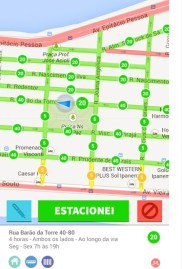
Park and check in
"So it's not good for the city to tow the car," Leonardo says. "It's not good for the citizen to get their car towed. It's not good for the Municipal Guard who has to deal with it, and it's not good for traffic."
"And even if you give the driver a ticket, the concept that a ticket is a way of educating a citizen – that's debatable," Igor says. "But what if you have an app that gives you a tap on your shoulder and says, 'Hey, you're inconveniencing someone.' That's a lot more humane than this vision of punishing the person."
The Open Road
First, let's help the driver who doesn't know where they can actually park. The Open Road team populated their app with the city's existing map of legal parking spots. The data is far from complete – it only maps out legal parking spots in downtown and Rio's trendy South Zone – but it's a starting point.
When you find a spot, you can use the app to see if you can actually park there. Then you check in, and the app asks you, "How was it finding a spot?" And you can say it was easy, hard, or so-so.
That check-in populates the Open Road database with real-time parking information. "So we're developing a collective intelligence about the parking situation," Igor explains. Both the city's data on where the legal spots are, and the collective wisdom of where the best place is to park, depending on the time of day."

You can tell the app how you found your car.
"This is also good for the city, because they're going to be able to understand where there's the most demand for street parking, where there's available parking, where you need to put up better signs," Leonardo says.
Let's say you check in to a parking spot that has a four-hour time limit and requires a parking ticket. The Open Road app will tell you that. "In our dream version of the future app, you can buy a new ticket directly from your phone," Leonard says. "But for now the app sends you an alert when your time is almost up, and shows you the fastest route to get back to your car. The faster you get there, the quicker you free it up for someone else."
Ygor, the Android developer, gets a word in to explain you get another alert when you're back at your car. "The idea is that when you get back to your car, the app asks you how you found your car."
According to Leonardo, the app displays a list that gives users options, such as whether your car is okay, whether if it got scratched, whether it is even still there, or if there is a flanelinha.
Flanelinhas are aggressively helpful guys who guide you into your parking spot – it's often a tight squeeze in Rio – and charge a dollar to keep an eye on your car. If they don't have an official uniform, they're offering their services illegally.
"So you can also pass information to the city on what areas have flanelinhas, and what time of day you should put a guard there. And you can share with the Security Secretary what areas of the city have the most incidents related to car damage or theft."
Now you have an app that tells you where you can park, where the spots are depending on the time of day, whether it's a safe place to park your car, and when your time is up.
But let's say you park on the sidewalk or block a driveway anyway – just for a few minutes – because you know it's going to be a long time before anyone gets around to ticketing or towing your car. This is where things get a bit creepy – or fun, depending on your appetite for privacy.
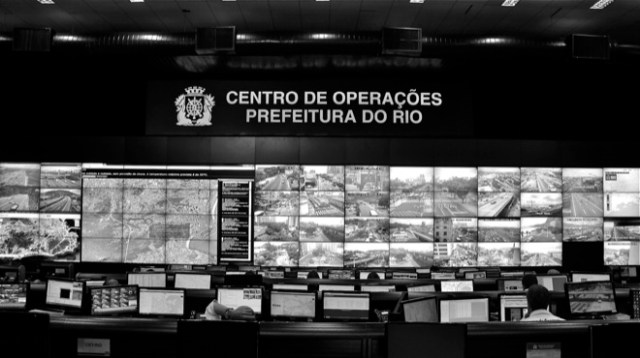
Rio's IBM-powered Operations Center houses the biggest surveillance screen in Latin America.
Rio's IBM-powered Operations Center, home to the biggest surveillance screen in Latin America, recently added a new layer to the data they monitor – a map of where each municipal guard is stationed, in real time, with their name, cell phone, and status (busy/available).
City Hall promised the Open Road team access to the data, so they'll be able to route illegal parking complaints directly to the nearest available guard on duty – effectively cutting out the message-passing from 1746 to the Municipal Guard, to the regional office, to the officer on duty.
They're also going to get access to the transportation department's database of all the registered cars in Rio, including the owner's name and cell phone number.
So the moment the guard gets an SMS with the location and license plate of the illegally parked car, the car's owner will get an SMS asking them to move their car. Now. Because a guard is 50 meters away from writing a ticket.
Whoever gets there first wins. And if the car owner gets there first, everyone wins, because the city doesn't have to call a tow truck. And since Open Road knows exactly what happened, they can send a report back to the person who reported the car and let them know what happened.
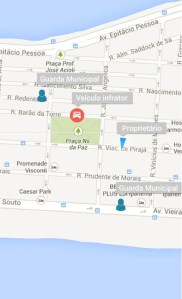
Game dynamics: Race the municipal guard back to your illegally parked car.
"We have to humanize the problem," Leonardo says. "Because if I file a complaint and I never hear what happens, I'm not going to file another one. What's the point?"
Now that five civic-minded guys have designed a win-win-win solution to one of the city's biggest unresolved complaints in the 28 hours that lapsed at the hackathon, we return to the sticky question of whether Open Road will ever see the light of day.
Team Open Road says they're ready to turn in the minimum viable product, or if the city gives them the appropriate resources, take it all the way to implementation.
"But there's no free lunch," Leonardo says. "There's work to do. The 1746 database is a mess. We need to harmonize the database of mapped parking spaces. We need to make adjustments to the Google Map. We need to talk to the transportation department and see what their API is like, if they even have one. It's very possible they're going to have to build one. That's a state-level department, so someone is going to have to negotiate with them for that to happen. The map of municipal guards on duty is easier, because it's city-level data, and it's ready."
"And who's going to pay for the SMS? We need to make an agreement with the government. So it depends more on the government than on us at this point. We can do something simple, but our issue is, we'll go at their speed. The ball's in their court."
If the city comes through on its promises, they might have just the kind of hot data project they can expand to other cities. And Mayor Paes can have a real-life example of Polisdigitocracy.
No hay comentarios:
Publicar un comentario